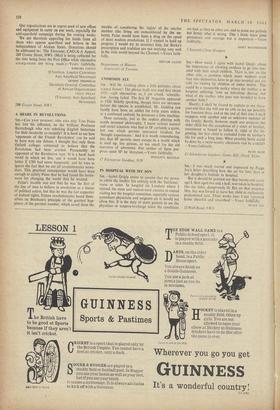A SHARE IN REVOLUTIONS
S1R,—Can your reviewer, who asks why Tom Paine has lost his influence, be the brilliant Professor Barraclough who was rebuking English historians for their insularity so recently? It is hard to see how 'opponents of the French Revolution' can be said to have won any debate; I thought that only three Oxford colleges continued to believe that the Revolution had been averted. Presumably an opponent of the Revolution says. 'It is a hard, hard world in which we live, and it would have been better if 1789 had never happened,' and he tries to ignore the fact that we are all revolutionaries nowa- days. This practical consequence would have been enough to satisfy Paine that he had found the instru- ment for changing the world that he wanted.
Paine's trouble was not that he was the first of the line of men to believe in revolution as a means of political action, but that he was the last supporter of natural rights. Future revolutionaries based them- selves on Bentham's principle of the greatest hap- piness of the greatest number, which saved them the
trouble of considering the 'rights' of the smaller number (the living are outnumbered by the un- born). Paine would have been a drag on the speed of most modern revolutions. If I wanted to bold up progress I would try to resurrect him, for Burke's prescription and tradition are not working very well in the wide world beyond the Channel.—Yours faith- fully.
Department of History, Univosity of Toronto
TREVOR LLOYD






































 Previous page
Previous page